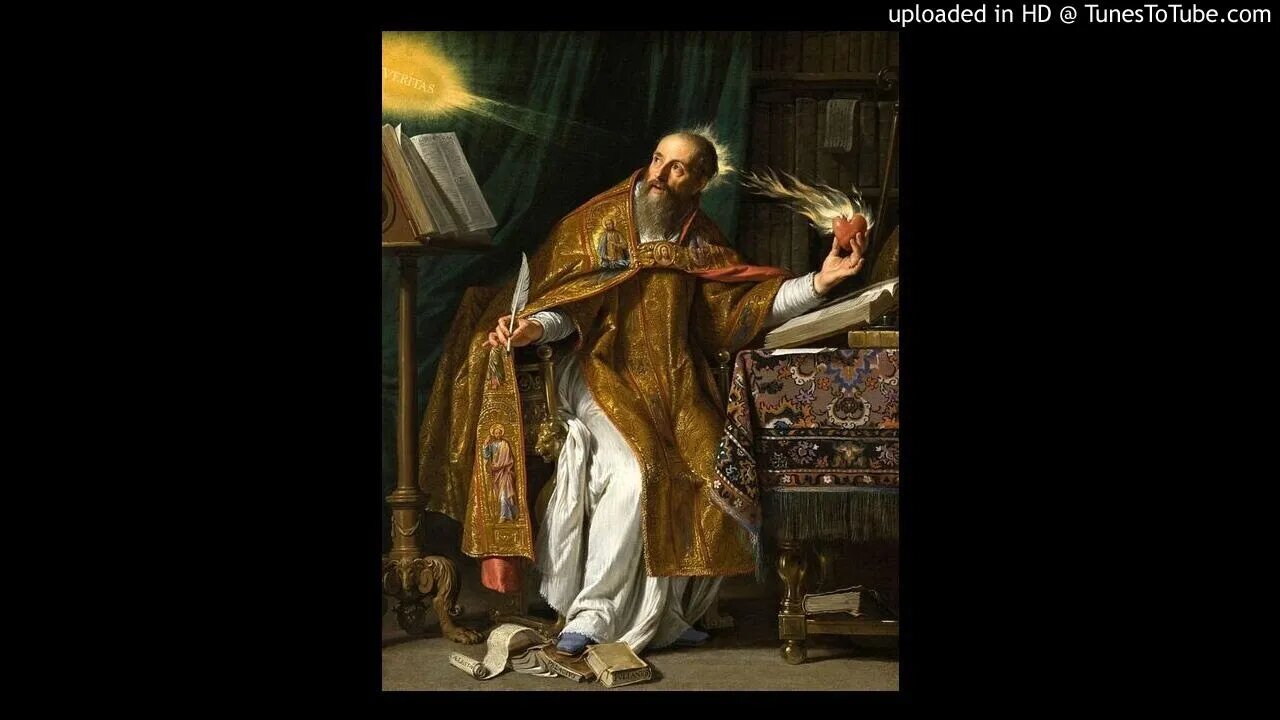Premium Only Content

The City of God - St. Augustine of Hippo - Ch. 16-36
Chapter 16.—Of the Violation of the Consecrated and Other Christian Virgins, to Which They Were Subjected in Captivity and to Which Their Own Will Gave No Consent; And Whether This Contaminated Their Souls.
Chapter 17.—Of Suicide Committed Through Fear of Punishment or Dishonor.
Chapter 18.—Of the Violence Which May Be Done to the Body by Another’s Lust, While the Mind Remains Inviolate.
Chapter 19.—Of Lucretia, Who Put an End to Her Life Because of the Outrage Done Her.
Chapter 20.—That Christians Have No Authority for Committing Suicide in Any Circumstances Whatever.
Chapter 21.—Of the Cases in Which We May Put Men to Death Without Incurring the Guilt of Murder
Chapter 22.—That Suicide Can Never Be Prompted by Magnanimity.
Chapter 23.—What We are to Think of the Example of Cato, Who Slew Himself Because Unable to Endure Cæsar’s Victory
Chapter 24.—That in that Virtue in Which Regulus Excels Cato, Christians are Pre-Eminently Distinguished.
Chapter 25.—That We Should Not Endeavor By Sin to Obviate Sin
Chapter 26.—That in Certain Peculiar Cases the Examples of the Saints are Not to Be Followed.
Chapter 27.—Whether Voluntary Death Should Be Sought in Order to Avoid Sin.
Chapter 28.—By What Judgment of God the Enemy Was Permitted to Indulge His Lust on the Bodies of Continent Christians.
Chapter 29.—What the Servants of Christ Should Say in Reply to the Unbelievers Who Cast in Their Teeth that Christ Did Not Rescue Them from the Fury of Their Enemies.
Chapter 30.—That Those Who Complain of Christianity Really Desire to Live Without Restraint in Shameful Luxury.
Chapter 31.—By What Steps the Passion for Governing Increased Among the Romans.
Chapter 32.—Of the Establishment of Scenic Entertainments
Chapter 33.—That the Overthrow of Rome Has Not Corrected the Vices of the Romans.
Chapter 34.—Of God’s Clemency in Moderating the Ruin of the City.
Chapter 35.—Of the Sons of the Church Who are Hidden Among the Wicked, and of False Christians Within the Church.
Chapter 36.—What Subjects are to Be Handled in the Following Discourse
On the city of God against the pagans (Latin: Dē cīvitāte Deī contrā pāgānōs), often called The City of God, is a book of Christian philosophy written in Latin by Augustine of Hippo in the early 5th century AD. The book was in response to allegations that Christianity brought about the decline of Rome and is considered one of Augustine's most important works, standing alongside The Confessions, The Enchiridion, On Christian Doctrine, and On the Trinity. As a work of one of the most influential Church Fathers, The City of God is a cornerstone of Western thought, expounding on many profound questions of theology, such as the suffering of the righteous, the existence of evil, the conflict between free will and divine omniscience, and the doctrine of original sin.
The sack of Rome by the Visigoths in 410 left Romans in a deep state of shock, and many Romans saw it as punishment for abandoning traditional Roman religion for Christianity. In response to these accusations, and in order to console Christians, Augustine wrote The City of God as an argument for the truth of Christianity over competing religions and philosophies. He argues that Christianity was not responsible for the Sack of Rome, but instead responsible for its success. Even if the earthly rule of the Empire was imperiled, it was the City of God that would ultimately triumph. Augustine's focus was Heaven, a theme of many Christian works of Late Antiquity. Despite Christianity's designation as the official religion of the Empire, Augustine declared its message to be spiritual rather than political. Christianity, he argued, should be concerned with the mystical, heavenly city, the New Jerusalem, rather than with earthly politics.
The book presents human history as a conflict between what Augustine calls the Earthly City (often colloquially referred to as the City of Man, but never by Augustine) and the City of God, a conflict that is destined to end in victory for the latter. The City of God is marked by people who forego earthly pleasure to dedicate themselves to the eternal truths of God, now revealed fully in the Christian faith. The Earthly City, on the other hand, consists of people who have immersed themselves in the cares and pleasures of the present, passing world.
Augustine’s thesis depicts the history of the world as universal warfare between God and the Devil. This metaphysical war is not limited by time but only by geography on Earth. In this war, God moves (by divine intervention/ Providence) those governments, political /ideological movements and military forces aligned (or aligned the most) with the Catholic Church (the City of God) in order to oppose by all means—including military—those governments, political/ideological movements and m
-
 18:12:15
18:12:15
Chesterton Radio
1 year ago $4.69 earnedChesterton Radio Live - Mystery Drama Adventure - Chuck the TV!
43.8K -
 2:43:00
2:43:00
TimcastIRL
4 hours agoTrump Demands IRAN SURRENDER NOW, Mobilizes For WAR, Jets Deployed | Timcast IRL
226K124 -
 LIVE
LIVE
Spartan
11 hours agoPro Halo Player | Ranked Arena breaking in a new controller
650 watching -
 2:34:37
2:34:37
Barry Cunningham
5 hours agoPRESIDENT TRUMP NOW HAS PROOF OF THE FRAUD OF 2020! BIG PHARMA IN TROUBLE! MORE NEWS!
83.6K36 -
 8:25
8:25
MattMorseTV
10 hours ago $1.14 earnedTrump just FLIPPED the SCRIPT.
25.5K27 -
 3:36:57
3:36:57
BigTallRedneck
4 hours agoCome Chill with the Redneck!
8.61K -
 DVR
DVR
TheBeardedBrent
3 hours ago🔴LIVE🔥 | WARZONE | BEADERED THE BOT HUNTER!! | ROAD TO 50 SUBS!!🔥
10K -
 1:27:44
1:27:44
Glenn Greenwald
7 hours agoTrump Declares the War in Iran to Be His Own; Journalist Ken Klippenstein on Trump's War Plans, DC Dems, and More | SYSTEM UPDATE #470
132K195 -
 2:42:21
2:42:21
RiftTV/Slightly Offensive
6 hours agoLAPD Shot ME?! Rioters RAN OVER, US Attacking Iran? | The Rift | Guest: Anna Perez + Braeden Sorbo
65.9K19 -
 2:12:14
2:12:14
TubButter
1 day ago $0.19 earnedMy aim is sharper in 1440P Warzone! (Maybe). 😉 Live now! #Warzone #1440p #FunnyFails #TubButter
25K